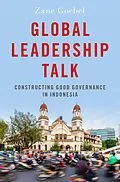How do certain ideas and practices become socially valued in particular times and places? Why do we see some countries as having better governance or leadership than others? In Global Leadership Talk, Zane Goebel addresses these questions through a study of leadership language in the uniquely diverse post-colonial nation of Indonesia. This book examines global flows of ideologies about leadership and good governance, how these ideologies are localized in Indonesia, and how all of this related to changing political, bureaucratic, and market regimes in Indonesia between 1998 and 2004. Drawing on five months of fieldwork and a corpus of hundreds of online newspaper articles regarding the Indonesian bureaucracy, Goebel analyzes how leadership ideas expressed in the early twenty-first century have been re-used and redefined in the media-and most importantly, how and why these ideas were received and believed in local face-to-face talk in the Indonesian civil service. Deftly engaging with decades of theoretical innovation, from indexicality to enregisterment, from globalization to superdiversity, Goebel moves beyond his empirical analysis to argue for a new methodology that constantly moves between data from different times and places. Both concretely and conceptually, Goebel shows how communicative events are connected, how this impacts the gathering and interpretation of data, and how this approach is key for understanding the sociolinguistic complexity of today's world.
Autorentext
Zane Goebel is Associate Professor of Indonesian and Applied Linguistics at the University of Queensland in Brisbane, Australia. He works on language and social relations in Indonesia and has published two monographs: Language, Migration and Identity (2010) and Language and Superdiversity (OUP 2015). His work in Indonesia has also lead to international collaborations culminating in three edited volumes: Reimagining Rapport (forthcoming from OUP), Rapport and the Discursive Co-Construction of Social Relations in Fieldwork Encounters (2019), and Contact Talk (2019).
Inhalt
CHAPTER 1 ORIENTATIONS 1.0 Introduction 1.1 Some reflections on reflexivity 1.2 Reflections on doing a linguistic ethnography 1.3 Layout of the book CHAPTER 2 GLOBALIZATION AND GOOD GOVERNANCE 2.0 Introduction 2.1 Enregistering and scaling chronotopes 2.2 Development, good governance, and changing life worlds in Indonesia 2.3 Uptake and recombination of signs of good governance within the government 2.4 Conclusion CHAPTER 3 NEWSPAPER REPORTS ABOUT GOOD GOVERNANCE 3.0 Introduction 3.1 Iconization, deictics, and interdiscursive hubs 3.2 Gathering and analyzing stories and the relationships between them 3.3 Constructing a mass mediated chronotopic identity 3.4 Conclusion CHAPTER 4 OFFICE LANGUAGE IDEOLOGIES 4.0 Introduction 4.1 Eliciting language ideologies 4.2 Distinguishing languages 4.3 Centers and peripheries 4.4 Condescension, reciprocity, and community 4.5 Conclusion CHAPTER 5 CHRONOTOPES OF GOOD GOVERNANCE IN THE OFFICE 5.0 Introduction 5.1 Inhabiting chronotopes 5.2 The dialogic construction of chronotopes of good governance 5.3 Chronotopic relations: emblems of good governance across speech events 5.4 Conclusion CHAPTER 6 REFLEXIVITY, CONNOTATION, AND BELIEVABILITY 6.0 Introduction 6.1 The representation of social relations in the field 6.2 Establishing believability in interviews 6.3 Chronotopes of ethnic social relations 6.4 Constructing and inhabiting the persona of a good leader 6.5 Representing social relations with staff 6.6 Conclusion CHAPTER 7 GLOBAL LEADERSHIP TALK 7.0 Introduction 7.1 Leadership talk 7.2 From codeswitching to signswitching 7.3 Leadership in Indonesia 7.4 Ideologies about leadership 7.5 Linking relational and transactional talk to reciprocity and good governance 7.6 Condescension, reciprocity, and good governance 7.7 Conclusion CHAPTER 8 CONCLUSION 8.0 Introduction 8.1 Chapters and concepts 8.2 Contributing to Indonesian studies
